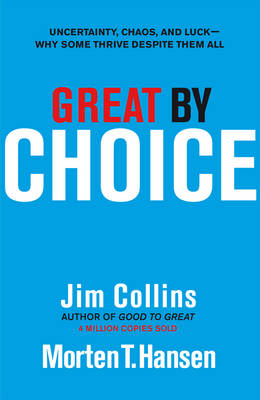Recommended Resource – Great by Choice
Great by Choice: Uncertainty, Chaos, and Luck – Why Some Thrive Despite Them All
by Jim Collins and Morten Hansen
About the Reference
Great by Choice by Jim Collins and Morten Hansen represents a detailed assessment of companies thriving in times of uncertainty compared with similar organizations not performing so well. In the analytical tradition of Built to Last, Good to Great, and How the Mighty Fall, Collins and Hansen imperially demonstrate that organizations performing well in tumultuous times:
- Have leaders who were more disciplined, more empirical, and more paranoid
- Believed that a ‘fast world’ necessitated ‘fast decisions’ and ‘fast actions’ was a good way to fail
- Changed less in reaction to the radically evolving world than their poorer performing comparison companies
Benefits of Using this Reference
StrategyDriven Contributors like Great by Choice for its data-driven analysis of organizational performance in turbulent times. We believe this assessment and its findings are particularly relevant given today’s highly uncertain marketplace.
However, StrategyDriven Contributors believe there are some flaws in Collins and Hansen’s analysis. First, it appears that a majority of the 10x companies were small, fragile, and subsequently more nimble than their comparisons during the early portion of the comparison period. We feel this difference in organizational structure materially influenced the results each company was able to achieve; the 10x companies having ‘less to lose’ were better positioned to take the actions necessary for a higher long-term payoff whereas their peers were laden with ‘historical scaring’ – legacy contracts and obligations, well established shareholder expectations, etcetera – and were subsequently more confined in what they are able to do and so were less likely to be able to take the action needed to achieve 10x gains.
Another flaw was the comparison of Microsoft to Apple. While both were high tech companies during the assessment period, Microsoft was a software company whereas Apple was an integrated software and hardware company; placing it in a very different business. We disagree that these companies were comparative.
Finally, Collins and Hansen do not broaden their analysis to include companies such as Microsoft and Apple that change performance positions over time. Subjectively, if a company can be great by choice, then turnarounds such as that which Apple orchestrated in the 2000s should not only be possible but, given the vast number of businesses in the marketplace over the past 100+ years and the several periods of market turbulence, should have occurred in other instances. Validating the Great by Choice principles against several turnaround examples would help strengthen their assertions – assuming they are true.
In spite of our analytical reservations, StrategyDriven Contributors like Great by Choice and believe it offers significant, if not groundbreaking, insight to the principles for building a successful organization regardless of the marketplace environment. For its data-driven insights of how to succeed during uncertain times, Great by Choice is a StrategyDriven recommended read.











Leave a Reply
Want to join the discussion?Feel free to contribute!